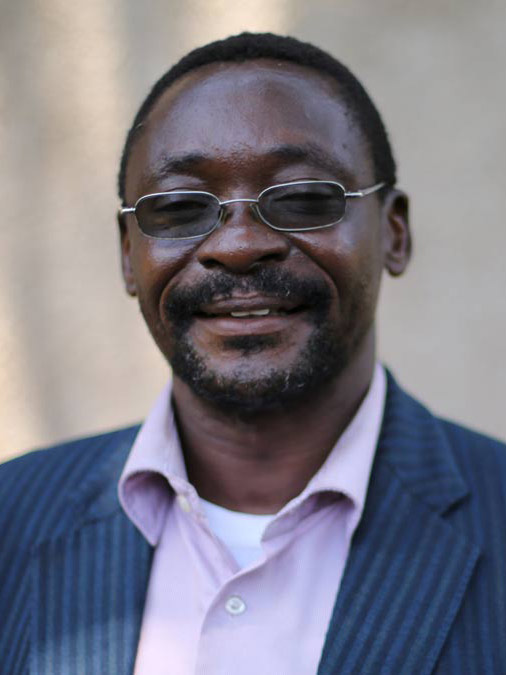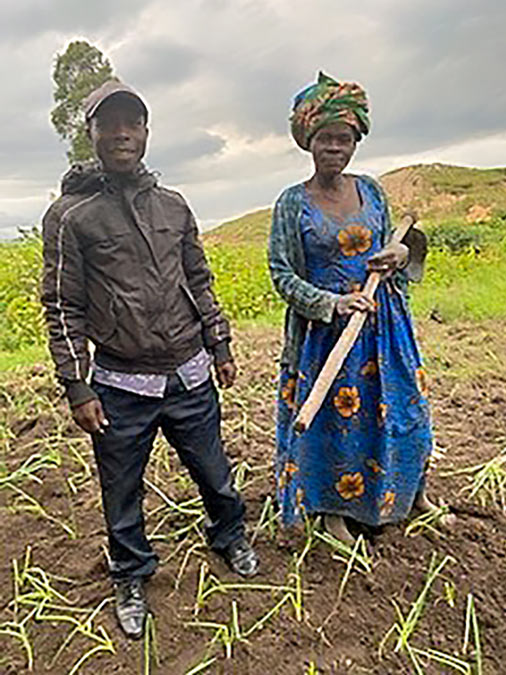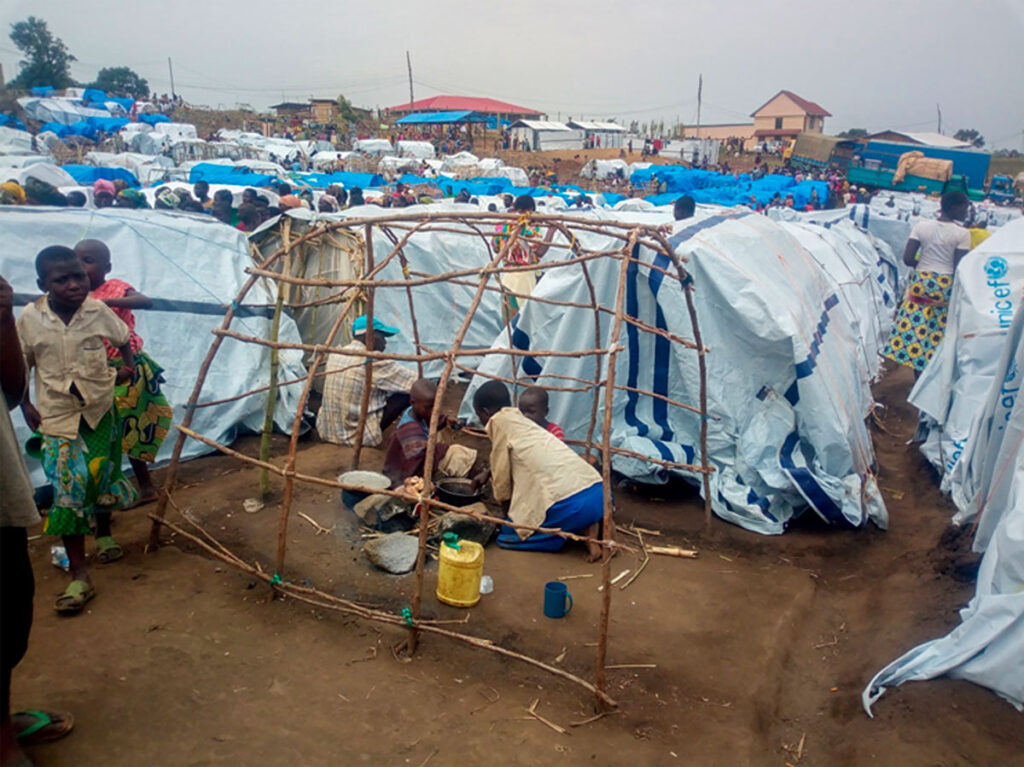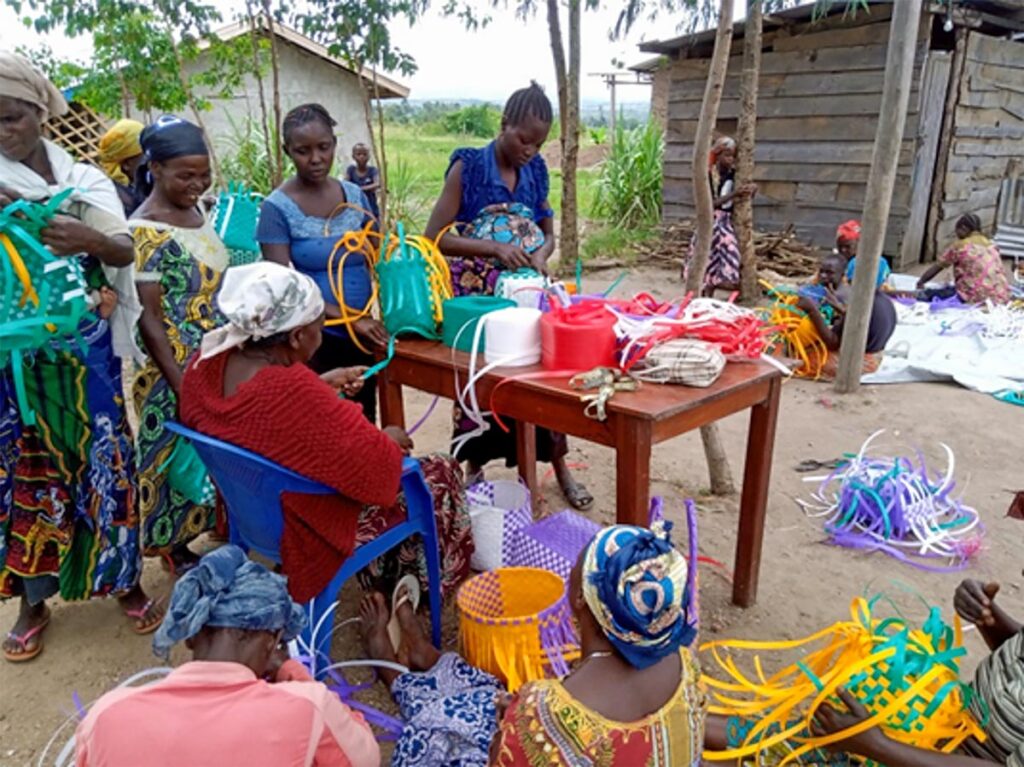From armed militia to minister
How our local partner Bisoke saw a man go from making war to seeking peace
Photo: Messengers of peace – Bisoke’s team share the gospel in refugee camps in eastern DR Congo
What can make someone go from being part of an armed militia to a minister of the gospel? As local partner Bisoke Balikenga shares the remarkable transformation story of Manasseh from DR Congo, his answer is clear – only Jesus.
“There was nothing else to do”
Manasseh never thought he’d join an armed militia. But one night he jolted awake to the sound of gunfire shattering the stillness of the night in his village in eastern DR Congo.
Dangerous militia men were coming: Manasseh and his wife were told to get out and run, escaping into the forest.
They lost everything – leaving behind their property, their possessions and the farm that supplied their food and income, with survival their only thought.
Without any of the security of his former life, Manasseh joined the militia group to survive. He explains, “There was nothing else to do. You’d left all your property, you cannot plant, you cannot farm, you cannot do business.”


He lived in the forest with the militia and later became the bodyguard of one of the commanders. Manasseh felt that life in the forest with the gangs was not good, and knew he was doing bad things – but he didn’t know where to turn.
Eventually the commander was arrested for war crimes and Manasseh knew he was at risk too. He ran away with his family, ending up in a refugee camp in Bunia.
Complex conflict
The people of eastern DR Congo have long felt the terrible effects of violent conflict.
CMS local partner Bisoke Balikenga works for peace in Bunia and explains, “The situation in DRC is very complex. In the north east of the country we have three militia groups attacking and killing people, and there are ongoing conflicts between different tribes too.
“Where I live in Bunia there used to be conflict between the Hema, who farm cattle, and the Lendu, who grow crops – this dated back to the period of Belgian colonial rule, but intensified 20 years ago.
“That conflict wasn’t fully addressed and now both groups have weapons. And we have 440 tribes in DRC, and they each have conflict with another tribe.
“People say, ‘if our group can have a weapon, it can protect our village’. So now all those people are fighting together.
“In Bunia, we have UN peacekeepers, and also government soldiers. That’s why in Bunia there is a bit of peace, but you cannot go more than 20km away.

“People are coming to Bunia because where they used to live the killing is still going on. There’s no way to stay – it is better to run away, to go where they can have peace.
“But when they get to Bunia, there is another terrible situation. People come having lost a loved one or some of their family, and when they reach Bunia, sometimes food and a place to stay is not easy to find.
“If there is peace, life in the village is nice. We have very good soil people can cultivate, so you can have land, you can eat very well and relax. But in town people need to buy everything and they don’t have money.
“When I talk about this situation, I feel so bad. People have been killed like insects. Our future is really not clear.”
Working for peace
In the face of this bleak reality, Bisoke, who works for the Anglican Church, is still seeing God at work through a peace centre he started. And Manasseh now works alongside him!
How did such a transformation take place? Bisoke is clear: “Only Jesus.”
The peace centre was born out of a request for Bisoke’s help and the gift of a small piece of land. After praying and talking to local leaders, Bisoke wanted to do something about peace.
Starting small, Bisoke and his colleagues cultivated crops and started to help women to learn to read so that they could access the Bible. Later they started teaching practical skills so women could earn an income.
When war came nearby, many people came to the centre knowing that there might be a welcome there.

The people arriving were traumatised and needed help, so Bisoke and his team got training in trauma healing and reconciliation to offer a trauma healing programme.
The centre provides food and access to clean water too, as people need these basic necessities before they can engage with the training.
Bisoke and his team face great challenges, but they are seeing God at work and seeing people become Christians and be transformed. Some are starting to be able to work together across divides.
Turning to Jesus
The Anglican team from the peace centre go into surrounding refugee camps to share the gospel, including the camp where Manasseh was staying.
Manasseh’s wife became involved with the peace centre first. Like other women receiving their support, she began to noticeably change.
Manasseh started to slowly get involved at the peace centre too, encouraged by the fact that the team showed him God’s love despite the terrible things he had done.
Bisoke recalls that when he first met Manasseh, he was not happy and could not laugh or smile.
Over time, they started to talk more and Manasseh took part in the trauma healing programme. He turned to Jesus, and over the five years since becoming a Christian he has participated in training with the peace centre and CMS-Africa.
CMS-Africa’s training aims to help people experience holistic transformation as their faith impacts all areas of their life.
Manasseh learned about self-reliance and having a biblical approach to money and resources, and as a result he planted crops, sold them and started a shop to provide for his family.
Bisoke’s team arranged for Manasseh to train for ordination in the Anglican Church, and now he is the pastor in an Anglican parish as well as working at the peace centre. He goes into the refugee camps to preach and share his testimony to encourage others.
Testifying transformation
There are more people like Manasseh who used to be in the militias coming to the peace centre.
Manasseh shares, “They go through a very difficult life, violence, no peace, conflict among themselves and within themselves. They can now see how I live outside, since I have come out and joined Jesus and been rehabilitated in the community.”
“Only Jesus” is Bisoke’s motto (click image to play)
At the peace centre, there are people who have been deeply traumatised by the militias experiencing support and healing from their suffering, as well as those who have participated in horrific violence.
Bisoke shares, “We keep seeing the way Jesus says: ‘I’m coming in to help those people who are sick.’ Then we see the people coming in are really vulnerable people.
“God has really put his hand on some people. They are becoming Christian. They are being transformed. Then some are saying, now we can work together.
“They say, ‘People were killing us. Then we ran away and we are here. We thought you really can help us, or the army can help us. No. Now we have seen the only one who can help us is Jesus.’
“That’s why we keep saying only Jesus. We like people to develop prayer a lot so they can discover Jesus. Then they will come back to help us, like Manasseh.
“It builds our faith, to see the way people are coming without anything. Then they become Christians. In spite of everything they face, some say, ‘Wow, we see things as very good,’ which means we’re really in the right place to help people.”